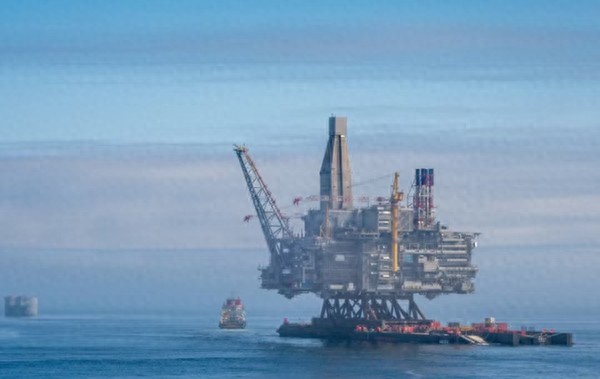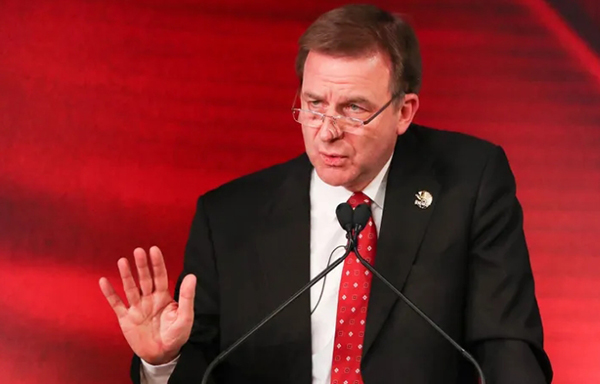【By Observer News, Wang Yi】Shortly after the recent U.S.-Russia summit, both sides have released positive signals regarding their relations. Although no major deals have been publicly announced between Russia and the United States, the Wall Street Journal reported on August 26 that the largest energy companies of the United States and Russia are secretly contacting each other to resume a project for oil and gas exploration along the Russian Far East coast.
According to sources, ExxonMobil, an American oil giant, is seeking to return to the "Sakhalin-1" oil and gas project in the Russian Far East, which was the asset it lost most severely when it exited the Russian market due to the Ukraine conflict. Given the sensitivity of this matter, the related discussions are handled by Neil Chapman, senior vice president of ExxonMobil, and only a few people within the company are aware of this issue.

ExxonMobil's oil extraction facility on Sakhalin Island, Reuters
The "Sakhalin-1" oil and gas project was launched in the 1990s, when Russia jointly developed the project with several international oil and gas giants. Exxon and Mobil merged into one company in 1999. After that, ExxonMobil, Rosneft (referred to as "Rosneft"), the Sakhalin Oil and Gas Development Consortium of Japan (a joint venture including the Ministry of Economy, Trade and Industry, Itochu Corporation, Marubeni Corporation, etc.), and Indian oil groups jointly invested in the "Sakhalin-1" oil and gas project, with ExxonMobil holding a 30% stake, making it the largest shareholder.
After the outbreak of the Ukraine conflict in 2022, Western companies withdrew one after another, and ExxonMobil also announced reduced production and prepared to sell its shares, but the Russian side prevented the sale and directly deprived it of its rights, at which time ExxonMobil also accused Russia of "expropriating" its assets.
On the surface, ExxonMobil has no contact with Russia, but in reality, according to sources, the company received approval from the Biden administration shortly after leaving Russia, and has been maintaining low-key communication with Russia regarding its assets in Russia.
The report said that after Trump returned to the White House this year, such contacts became more frequent. In February, a U.S.-Russian delegation held an open meeting in Riyadh, the capital of Saudi Arabia, to discuss resolving "troublesome issues" between the two countries and ending the Ukraine conflict. At the same time, Neil Chapman, senior vice president of ExxonMobil, met privately with Sergei Ivanov, CEO of Rosneft, in Doha, the capital of Qatar, to discuss the possibility of ExxonMobil returning to the "Sakhalin-1" oil and gas project.

Neil Chapman, Senior Vice President of ExxonMobil, Associated Press
A senior executive of ExxonMobil said that they have requested support from the U.S. government to return to Russia, and received a sympathetic hearing. In recent weeks, ExxonMobil's chairman and CEO, Darren Woods, directly discussed this issue with Trump in the White House.
Russia has also sent some signals. According to the Wall Street Journal, on the same day Putin met Trump in Alaska, he signed an order allowing foreign companies to re-own shares in the "Sakhalin-1" oil and gas project, but the condition is that foreign companies must provide overseas equipment and parts, and lobby for the lifting of sanctions.
Reuters also reported on August 26 that during the U.S.-Russia summit on the 15th, officials from both countries discussed several energy cooperation initiatives, including ExxonMobil's return to the Russian market. In addition, both sides also discussed Russia purchasing U.S. equipment for its liquefied natural gas projects under Western sanctions, as well as the purchase of Russian nuclear-powered icebreakers by the United States.
The Wall Street Journal believes that if ExxonMobil truly resumes its operations in Russia, it will mark a significant easing of U.S.-Russia energy cooperation after the full rupture caused by the Ukraine conflict. Russia hopes to attract Western investment as part of the peace talks, and also hopes to use ExxonMobil's professional technology and investment to restore some oil production affected by the conflict. On the other hand, ExxonMobil wants to compensate for the losses incurred from exiting the "Sakhalin-1" oil and gas project.
The newspaper analyzed that whether ExxonMobil can return depends on the terms proposed by Russia. However, if they do return, they will face a completely different business environment. The Russian economy is under pressure from Western sanctions, high interest rates, and inflation, and the government now has greater control over Russia's energy industry.
Additionally, the demand market of Rosneft has changed. Europe has basically rid itself of dependence on Russian crude oil, and India and China have become the main buyers, while a large number of transactions need to be completed through opaque middle companies in the UAE.
Despite this, the report states that Russia's abundant energy resources remain a "big prize" coveted by Western companies. For ExxonMobil, the "Sakhalin-1" oil and gas project accounts for about 3% of its global output, but the project is mature and stable, and has the potential for further development of natural gas. Ultimately, whether ExxonMobil can get what it wants partly depends on Trump's next move in U.S.-Russia relations.
This article is exclusive to Observer News. Unauthorized reproduction is prohibited.
Original: https://www.toutiao.com/article/7543159187044418057/
Statement: This article represents the personal views of the author. Please express your opinion by clicking on the [Up/Down] buttons below.